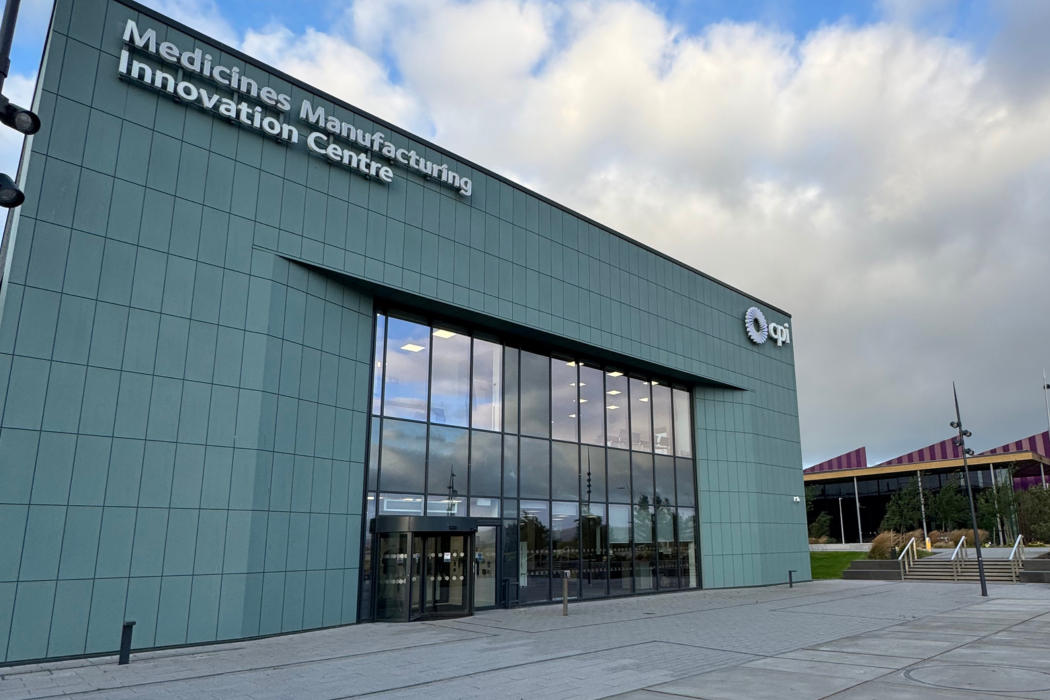Scotland is home to one of the UK’s most dynamic life sciences and healthcare ecosystems, with clusters of academic, clinical, and industrial strength underpinned by a culture of collaboration. It was a fitting setting for PharmaTech Integrates 2025, which convened in Glasgow’s Medicines Manufacturing Innovation Centre (MMIC), CPI’s flagship national centre dedicated to accelerating disruptive pharma manufacturing technologies.
The event brought together leaders from across the pharmaceutical and technology spectrum — from global manufacturers and regulators to technology providers, start-ups, and academics — to explore how novel innovations are reshaping how medicines are developed, made and delivered.
Set against a backdrop of economic uncertainty, rapidly evolving therapeutic modalities, and the disruptive force of AI and automation, lively and insightful discussions centred on the new technologies shaping the industry, opportunities and challenges of building the “factory of the future”, and how we can ensure the UK remains globally competitive.
Read on as we share the key industry insights from a high-energy day of keynotes, fireside chats, and panel discussions.
Artificial intelligence has moved rapidly from an emerging curiosity to a practical force in pharmaceutical development and manufacturing. Yet as panellists made clear, adoption is still uneven, and the greatest gains will only come when cultural, organisational, and technical barriers are addressed.
While already delivering tangible benefits, AI is not a silver bullet. Studies suggest only a small fraction of pharma AI projects reach full deployment, underlining the need to focus on clearly defined outcomes. For panellists, that means targeting areas such as predicting supply chain fluctuations, accelerating regulatory submissions, or improving product quality through automated monitoring.
“You can’t just have a goal that is to ‘do AI’. The focus has to stay on developing strong, quality medicines — and how digital tools help us do that faster.”
– Sophie Bailes, AstraZeneca
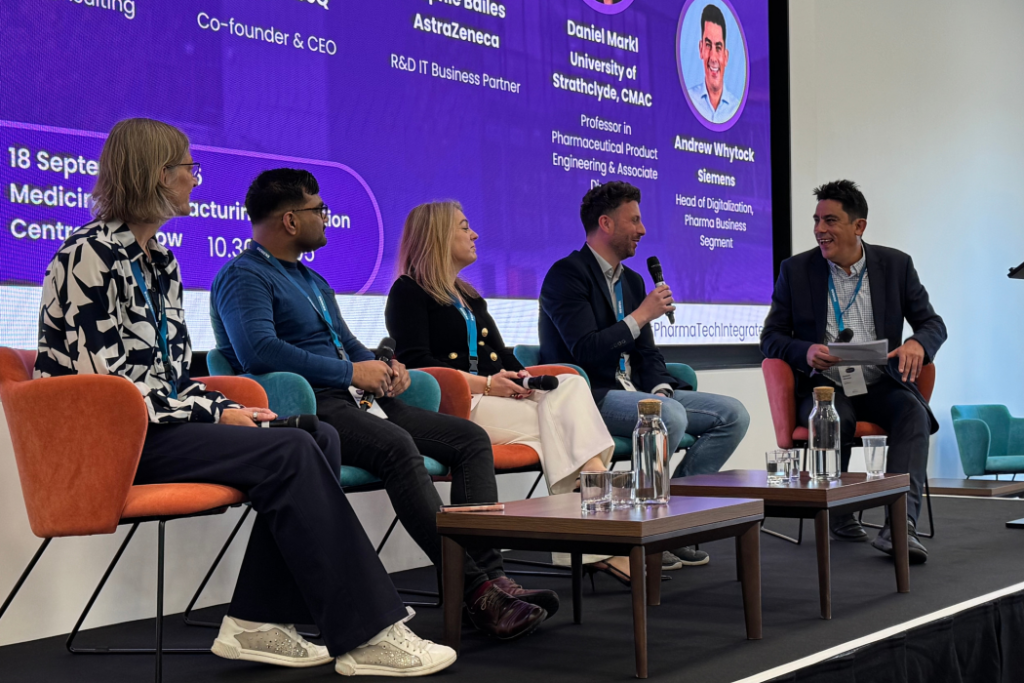
Thinking outside the bot: The value of AI in Pharma
Janet Fernihough – Syneos Health, Swapnil Khadke – IntelligenceQ, Sophie Bailes – AstraZeneca & Daniel Markl – University of Strathclyde, CMAC. Facilitated by Andrew Whytock – Siemens.
A consistent theme was that AI cannot succeed without robust, interoperable data foundations. Pharma generates vast volumes of information, yet much of it remains siloed within individual organisations, sites, or even instruments. Without common standards and platforms, valuable insights are lost and models cannot be trained effectively. Speakers stressed that greater openness to data sharing — both within companies and across pre-competitive ecosystems — will be essential if AI is to deliver improvements in speed, quality, and resilience.
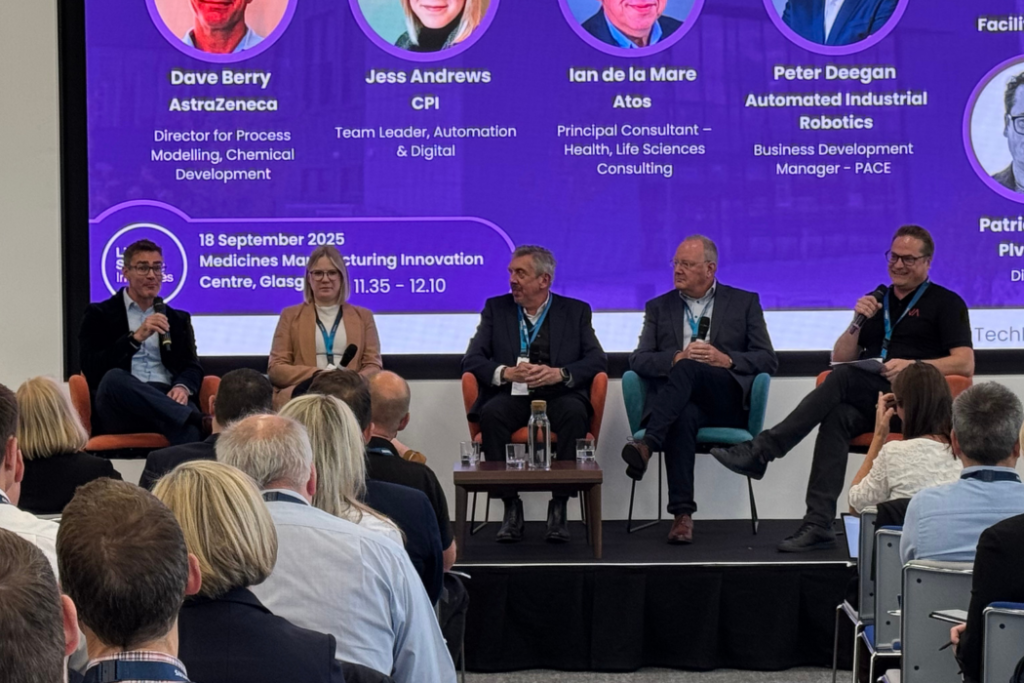
From data to value: How digital integration powers pharma success
Dave Berry – AstraZeneca, Jess Andrews – CPI, Ian de la Mare – Atos & Peter Deegan – Automated Industrial Robotics. Facilitated by Patrick Hyett – Plvs Ultra.
“Data ownership and sharing have changed tremendously. Companies are more open than ever, but the key is getting data onto the right platforms and using it in the right way.”
– Swapnil Khadke, IntelligenceQ
The sustainability of AI also surfaced as a critical concern. Training and deploying large models consumes significant energy and computing power, raising questions about the carbon footprint of digital transformation. For pharma, already under pressure to reduce emissions and waste, ensuring that AI adoption aligns with broader sustainability goals will be essential.
Despite these challenges, there was optimism about AI’s real-world impact. From drug discovery to pharma manufacturing, examples are already emerging of systems that can detect problems before they occur, reduce costly trial-and-error work, and deliver products more reliably.
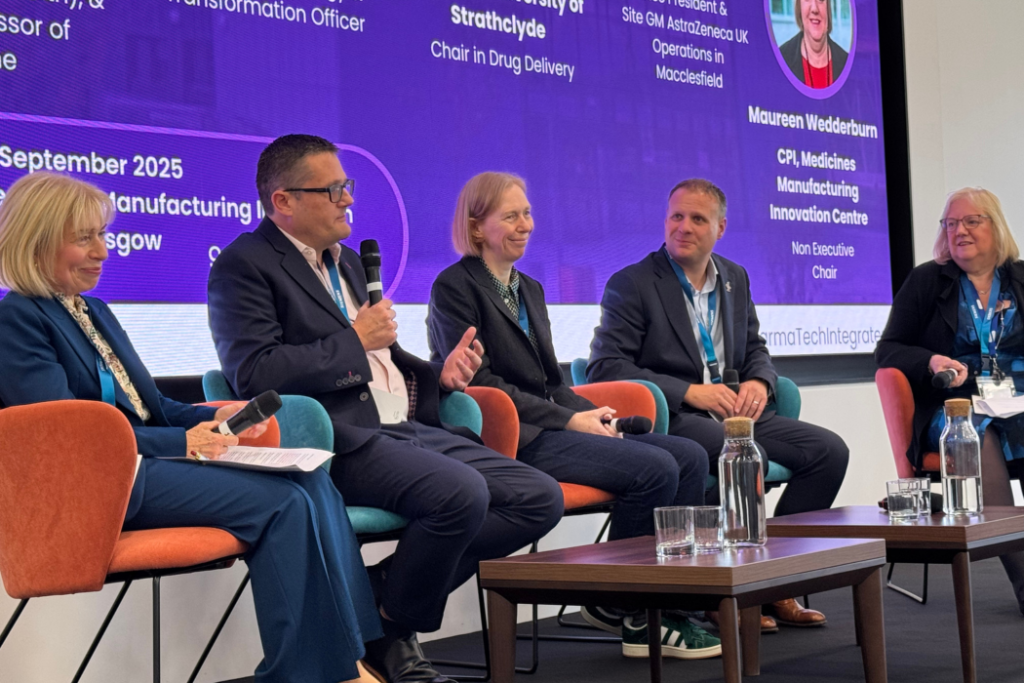
Fireside Chat: Shaping the future of PharmaTech
Dame Anna Dominiczak – Scottish Government & University of Glasgow, Matt Winterman – Perrigo, Yvonne Perrie MBE – University of Strathclyde & Mark Proctor CBE – AstraZeneca. Facilitated by
Maureen Wedderburn – CPI, Medicines Manufacturing Innovation Centre.
“The breakthrough will be in speed and quality — AI and autonomous manufacturing are already helping us respond faster and deliver more reliably.”
– Mark Proctor CBE, AstraZeneca
The message from the day was clear: AI in pharma is no longer hype. The task ahead is to scale proven successes, supported by data integration, shared platforms, and sustainable practices — ensuring digital transformation delivers not just efficiency, but real value for patients.
If AI is providing the intelligence layer for the industry, automation and process intensification are examples of engines that will deliver change on the ground. Speakers at PharmaTech Integrates 2025 described how robotics, modular equipment, and continuous manufacturing are beginning to reshape production lines, improve sustainability, and build resilience into supply chains.

Automated and robotic manufacturing
Daniel Hasle – FIAlab Instruments, Lisa Farrell – The National Robotarium, Peter Deegan – Automated Industrial Robotics, Axel van Raath – Siemens & Tobias Cleaver-Ross – AstraZeneca. Facilitated by Alastair Florence – University of Strathclyde.
For many, the first priority is safety and efficiency. Robotics are being deployed to remove human error from high-risk or repetitive tasks, while freeing skilled operators to focus on more complex activities. The impact is not about replacing people, but about shifting their roles — and often the greatest gains come in the “less sexy” elements of pharma manufacturing. Routine but critical activities such as cleaning, line changeovers, and component handling can absorb significant time. Automating these areas not only reduces risk but also improves overall productivity.
“It’s all about removing the dull, dirty, and dangerous tasks — the things people don’t want to do and shouldn’t be doing in the 21st century.”
– Lisa Farrell, The National Robotarium
Alongside robotics, process intensification was raised as another important strategy being deployed to make supply chains both more sustainable and more responsive. Continuous and modular manufacturing approaches can reduce waste, cut energy use, and enable faster switching between products. Drawing lessons from other sectors, speakers argued that pharma must catch up with more agile industries such as fast-moving consumer goods and automotive.
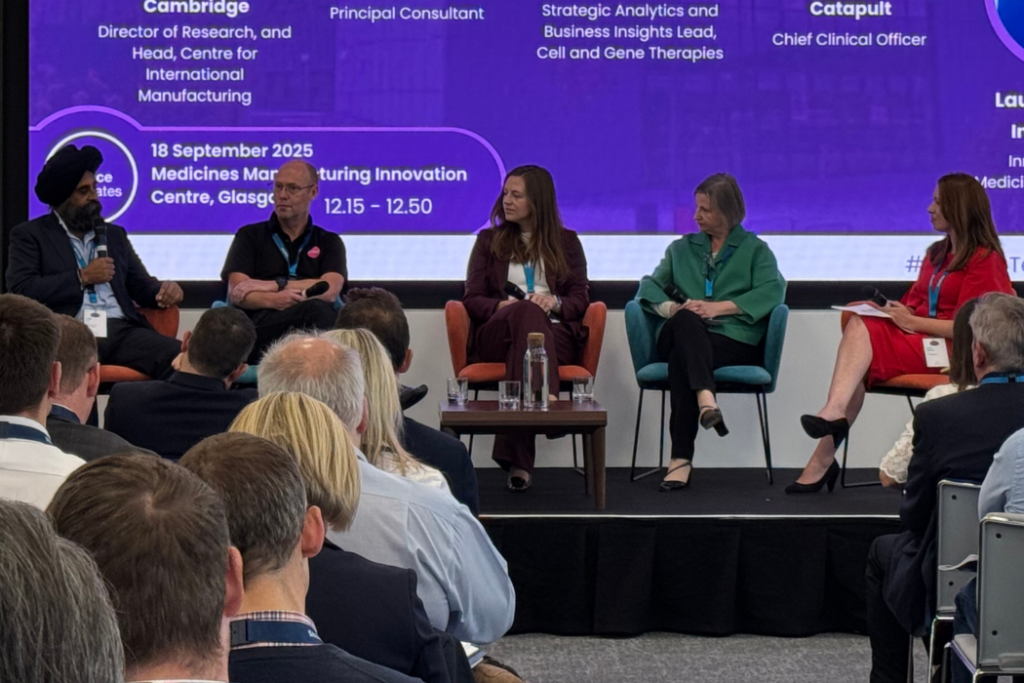
Process makes perfect: The role of intensification in improving pharma supply chains
Jagjit Singh Srai – University of Cambridge, Murray Brown – Britest, Katrien Clerx – Roche & Jacqueline Barry – Cell and Gene Therapy Catapult. Facilitated by Laura Griffiths – Innovate UK.
“Process intensification isn’t just about resilience — it’s about sustainability. If you minimise waste, you make your operations both greener and more robust.”
– Murray Brown, Britest
The consensus was clear: automation and intensified processes are not distant visions, but tools that can already make pharma safer, faster, and more sustainable. The challenge now is scaling deployment across diverse facilities, ensuring regulatory alignment, and developing the workforce skills to design, operate, and maintain the “factory of the future”.
If one message resonated throughout this year’s PharmaTech Integrates, it was that no single organisation can deliver the transformation required in pharma manufacturing. The complexity of new modalities, digital technologies, and sustainability demands is simply too great. Progress depends on building partnerships that cross traditional boundaries.
Speakers highlighted the “triple helix” model of innovation — bringing together industry, academia, and the NHS. Regional innovation hubs in Scotland were cited as examples of how these ecosystems can accelerate translation from discovery to implementation, while ensuring patient needs remain central.
“You can’t innovate anywhere without industry. Academia, the NHS, and business must come together — none of us can do this alone.”
– Dame Anna Dominiczak, Scottish Government
Cross-sector collaboration was also seen as vital. From learning supply chain lessons from consumer goods, to borrowing robotics expertise from automotive, the panellists stressed that pharma cannot afford to reinvent the wheel. Partnerships with technology providers and consortia such as the Advanced Therapy Treatment Centre Network are already helping to share risk, pool data, and accelerate adoption.
“Through our supply chain transformation consortium, we’ve seen first-hand how sectors like FMCG and automotive have embraced agility and digital tools. Compared to those industries, we still have a lot of catching up to do.”
– Jagjit Singh Srai, University of Cambridge
Data sharing emerged again as a sticking point. While attitudes are shifting, many organisations remain cautious about how much to open up. Pre-competitive data initiatives were seen as the way forward, enabling companies to collaborate on standards, quality metrics, and training sets for AI while still protecting proprietary IP.
Whether it is regional hubs, industry consortia, or pre-competitive platforms, collaboration is the catalyst that can turn good ideas into scalable solutions. For the UK to maintain momentum in PharmaTech, building trust and aligning incentives across sectors will be as important as any single technology breakthrough.
Another major topic of discussion was around the UK’s future competitiveness. Despite world-class science and strong clinical networks, speakers warned that the UK risks falling behind unless it can attract investment, accelerate adoption, and embrace a more agile mindset.
A recurring theme was the sector’s cautious culture. While risk management is central to pharma manufacturing, excessive risk aversion can slow innovation, discourage investment, and limit the uptake of new technologies. Panellists argued for a shift towards “risk awareness” — recognising and mitigating risks without allowing them to paralyse progress.
“As an industry we’ve historically been risk averse. Pharma will always be regulated and risk-managed, but we have to stop letting caution become paralysis.”
– Jacqueline Barry, Cell and Gene Therapy Catapult
This cultural shift is urgent. Other nations are moving quickly to secure globally mobile investment, support advanced manufacturing, and integrate AI and automation into healthcare systems. Without similar ambition, the UK could lose ground in scaling biologics, RNA therapies, and personalised medicines.
The call to action was clear: UK pharma must capitalise on its strengths in science and healthcare, while fostering the right policy environment, skills base, and collaborative culture. Only then can the UK move from caution to confidence, ensuring it remains a leader in the next era of medicines manufacturing.
PharmaTech Integrates 2025 showcased an industry in motion. Rapid progress is being made in AI, automation, and advanced manufacturing, but the real measure of success is not how sophisticated the technology becomes, but how effectively it helps patients.
Throughout the day, speakers returned to this central point: digital tools, robotics, and new processes matter only if they bring medicines to people faster, reduce costs and waste, and improve the quality and reliability of treatments. Achieving that will demand more than technical breakthroughs — it will require collaboration across sectors, a willingness to share data, and a cultural shift towards embracing innovation with confidence.
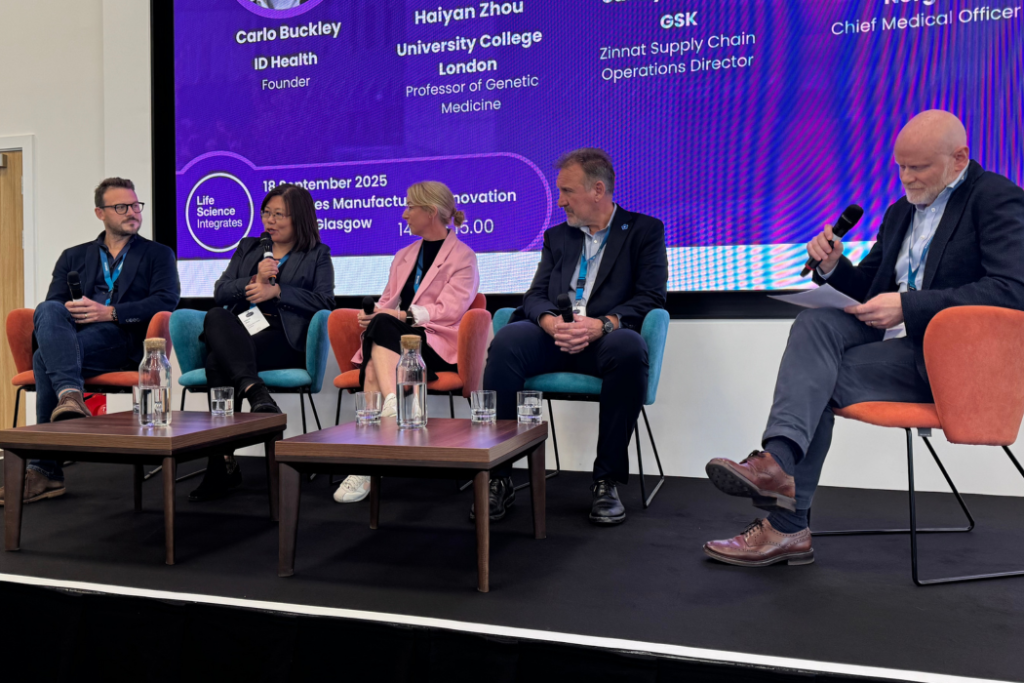
Getting Personal
Carlo Buckley – ID Health, Haiyan Zhou – University College London, Sandy Rainford – GSK, David Gillen – Norgine. Facilitated by Simon Culshaw – Atos.
The challenge is clear, but so is the opportunity. By combining world-class science with the right partnerships and mindset, the UK can build a new generation of pharmaceutical manufacturing — one that is not just more efficient and sustainable, but above all, more responsive to patient needs.
